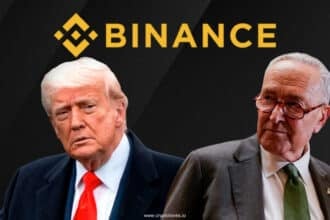Brian Armstrong, the CEO of Coinbase, expressed strong confidence this week about the advancement of legislation aimed at the market structure for digital assets in the cryptocurrency space. He noted that this legislation would protect all non-stablecoin crypto assets, such as Bitcoin and Ethereum. He compared the legislative process to a “freight train leaving the station,” emphasizing the strong support from both Democrats and Republicans in Congress.
Armstrong, who met with US lawmakers from both parties over several days, shared his views in a video posted on X. “This is how we ensure the crypto industry can be built here in America, driving innovation and protecting consumers, and making sure we never have another Gary Gensler trying to take your rights,” he said, referring to the current SEC chair’s enforcement-heavy approach to crypto.
He added that the lawmakers won’t allow the banking industry’s attempt to ban interest on stablecoins. In mid-August, banking groups said stablecoins that pay interest could harm traditional banks, which rely on high-interest savings accounts to attract deposits for funding loans. These groups tried to ban interest on stablecoins in the GENIUS Act but failed.
He further highlighted robust Senate support, noting that members across the aisle are eager to advance the draft bill. The legislation is currently in a back-and-forth refinement stage before broader public input from industry stakeholders. Senator Cynthia Lummis, R-Wyo., a leading proponent, predicted earlier this month that the bill could reach the U.S. President Donald Trump’s desk for signature by the year’s end.
The roundtable discussions drew executives from major crypto firms, including Ripple, Kraken, Circle, and Cardano, as well as venture capital players like Andreessen Horowitz (a16z), Paradigm, and Multicoin Capital. These sessions underscored growing momentum for structured oversight that balances innovation with consumer safeguards.
Kraken CEO urges bill to protect crypto builders
Kraken CEO Arjun Sethi emphasized the need to prioritize developers and innovators in the bill’s framework. During the talks, Sethi advocated for protections that extend to protocols, blockchains, memes, tokenized equities, and other utilities.
“Thank you to everyone in DC fighting for crypto’s future. But the real fight is bigger: protecting the right to build protocols, chains, memes, tokenized equities, commodities, utilities, etc., and ensuring incentives stay with the builders, not just incumbents,” he posted on X.
Momentum builds for bitcoin reserve
Separately, momentum is building around a proposed national bitcoin reserve. On Tuesday, August 16, 2025, 18 crypto leaders, including MicroStrategy Executive Chairman Michael Saylor, met U.S. lawmakers and had a productive meeting to talk about creating a national Bitcoin reserve backed by the Trump administration at Capitol Hill.
They discussed the BITCOIN Act, a proposal from Senator Cynthia Lummis, which aims to have the U.S. government buy one million Bitcoin over five years without adding to the national budget.
To fund this, they suggested ideas like revaluing the Treasury’s gold certificates or using money from tariffs. These efforts indicate the crypto industry’s push to grow in the U.S. while competing globally.
Lawmakers are working more closely with the industry, which is a positive change, but the bill still needs to pass through committees and votes to become law. For now, crypto leaders see these discussions as an important step forward.
Also Read: UK FCA to Relax Crypto Rules, Boost Cyber Laws: FT













